One word – serendipity.
In 2015, I submitted a proposal entitled McGill NooX (“Neighbourhood Book Exchange”) to be considered for funding through the Library’s Innovation Fund. On paper, the McGill NooX project involved a collaboration between McGill students, faculty, staff, departmental units, and neighbourhood partners along with the McGill Library. The project would see the installation of 3-6 specially marked receptacles in key, high-traffic areas outdoors and across all campuses. The book “containers” or “boxes” would be built with re-purposed materials. Much like a bus stop, these “reading stops” would be a recognizable destination where people could browse, take a book to go, or leave a book behind to share. Online presence for the project would include a map of all receptacles on campus, partner listing, and dedicated feedback page. The goal? Sharing knowledge; breathing new life into old things; bolstering sustainable practices on campus; promoting a sense of community and learning at all ages. The McGill NooX project was approved in the summer of 2015 – just in time for me to go on a one-year maternity leave.
Life happens. Project postponed. Little did I know that this delay would result in something bigger for this little project.
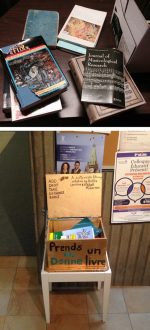
Original problem in McGill Faculty of Education hallways (top) and makeshift LFL as solution (bottom) Photo courtesy of Amélie Lemieux
Meanwhile…
In January of 2016, McGill graduate student Amélie Lemieux and two colleagues initiated a pilot Little Free Library (LFL) box in the Faculty of Education to address the overwhelming presence of leftover books throughout the university hallways and communal spaces. The box was maintained/checked locally by students to ensure movement of the books and to see if the project was developing as expected. Via a feedback notebook connected to the LFL, community members left positive responses about the initiative. The pilot project was a grassroots success circulating more than 160 items over a term per box. As a result, Amélie wanted to expand this communal opportunity to include other McGill locations across campus.
Spring forward to spring 2017, a colleague of mine happens to come upon a student job posting at McGill for the Little Free Library (LFL) project proposed by a McGill student and managed through McGill’s Sustainability Projects Fund. To my delight, both McGill NooX and LFL projects were similar in scope and after many great discussions and the creation of a shared vision and action plan, Amélie Lemieux and I decided to join forces to work on the project together. It was understood that Amélie would continue to undertake this project as principal lead.
The project did face some challenges. Initially, we wanted to link the boxes to a local initiative that created and distributed little free libraries but the McGill project did not match the book-sharing network’s intended audience demographic so we had to find an alternative receptacle and remain in/under budget. I had my heart set on the LFLs being installed outside on university grounds. We quickly realized that having them indoors and stewarded by people in the building was a better way to go logistically – plus we didn’t need to weatherproof the boxes! With the help of student project assistant Elena Bouton, five little free libraries (re-purposed bright yellow newspaper boxes!) were ordered, branded, and installed in high-traffic areas of the Brown, Education, Burnside, and Redpath Library buildings just in time for the start of the 2017-2018 academic year. Units are managed on an occasional basis by staff/student volunteers who verify that LFLs are maintained and not overflowing. A micro-site was developed to promote the project and features feedback mechanisms (online feedback form and contact email) so that the project can grow and improve.
So what do users think of McGill LFLs?
The response has been overwhelmingly positive. Most users surveyed about the original 5 LFLs, both formally and informally, have indicated that they see the initiative as a useful addition to campus. Here’s a taste of what we heard from users:
Je trouve d’ailleurs que les endroits où ont été placés les livres sont plutôt bien pensés. Ils permettent parfois de croiser d’autres gens qui prennent des livres, et d’engager une conversation avec eux.
I think it makes books more accessible to students, who otherwise may not spend money on books that aren’t required for their courses.
Like any project, there are always things that can be improved upon and user feedback has been an integral part in how this project has moved forward. Some of the recommendations from users include:
- More promotion. LFL users have told us that they heard about the project through word of mouth or just by walking by the yellow boxes. The project needs more formal, streamlined promotion and we’re on it. A revised online presence is currently under development that I hope will be a good step towards upping our promotional game. Other ideas that have bubbled to the surface include finding a way to track the movement of books with a dating system and the promotion of textbook donation.
- Create more clarity around concept/name through streamlined messaging. We decided to name the project “McGill Little Free Libraries” and brand them as such because the Little Free Library movement and its motto – take a book, leave a book – is simple, far-reaching (70,000+ libraries in 85 countries) and well known. One user was concerned that the LFL project isn’t really a “library” in the “service centered organization” sense of the word – you don’t have to bring books from the yellow boxes back if you don’t want to – and they are correct. Others don’t take issue with the concept relaying that libraries and the ways in which we use them mean different things to different people – you can have a library at home and have your shelves be open to an exchange of books with anyone who visits. As someone who has had a makeshift LFL on their front lawn in the Mercier-Hochelaga-Maisonneuve area for two years now, I often chat with people at the book exchange box to see what they think about it. They love the simplicity of the concept – take a book, leave a book – and keep coming back to the ways in which it brings them joy to share a piece of literature they have loved or find a book that they can enjoy as a family. Moving forward we will keep coming back to that key message and incorporate the great feedback we have heard to get the word out. Ongoing dialogue around the project and its goals is important so please feel free to send questions, thoughts, concerns to lflmcgill@gmail.com
Little free library, community book exchange, NooX, book box – one thing is for sure – these community receptacles are a place for discovery. You never know what you’re going to find. As one user states, “One person’s trash is another’s treasure.”
What’s Next? A Sneak Peek
Positive word of mouth has worked. We have received numerous requests from individual students, student groups, and staff members to grow the project. This September, the McGill community will have access to 17 LFLs across the entire campus including Macdonald Campus, the Gault Estate and 10 downtown Residences. Look out for launch of phase two this September!




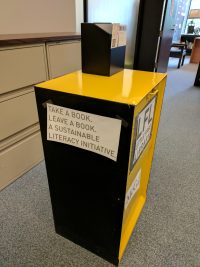
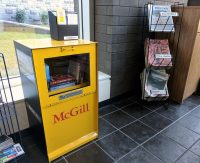
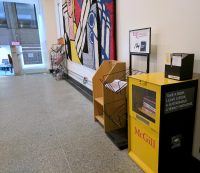
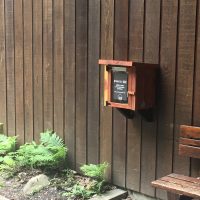










Leave a Reply
You must be logged in to post a comment.